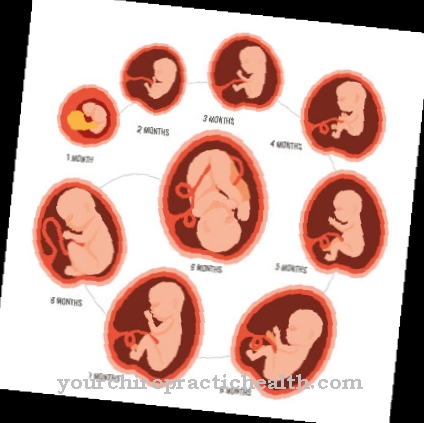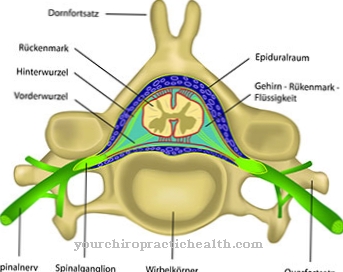As Binge eating one describes a psychological eating disorder in which the affected person consumes large amounts of food in recurrent binge eating (the English word binge means something like "feast"). While bulimia and anorexia primarily affect young girls, binge eating occurs regardless of age. About 30 percent of those affected are male. According to estimates, around two percent of the population in Germany is affected by binge eating.
What is binge eating?

© lassedesignen - stock.adobe.com
People who are affected by binge eating suffer from food cravings over and over again several times a week, during which they ingest large amounts of food in a short period of time. The mostly high-calorie foods are hastily devoured. The patients do not eat with pleasure, but compulsively and far beyond the feeling of satiety, until an unpleasant feeling of fullness occurs.
In these situations, they no longer have control over their eating behavior and cannot prevent the occurrence of the seizures or consciously end them, so that binge eating is to be classified as an eating disorder - comparable to anorexia or bulemia. In contrast to the latter, however, binge eating does not try to compensate for the binge eating by vomiting, excessive exercise or starvation - as a result, binge eaters are usually overweight.
On the other hand, not every overweight person is also a binge eater: Most obese patients do not have binge eating, but instead continually consume too much food. Those affected experience the binge eating as uncomfortable and are associated with a high level of suffering.
causes
The causes of binge eating are many; As with most eating disorders, the disturbed eating behavior is often based on emotional difficulties. It can happen that the binge eating serves to avoid and suppress unpleasant feelings. The overeating then follows the purpose of masking anger, disappointment, or sadness.
Accordingly, Binge Eatig is often associated with depression or anxiety disorders. Sometimes people with emotional disorders are also unable to properly perceive negative feelings or emotional needs and mistake them for hunger. Self-esteem conflicts also often play a role in developing a binge eating disorder.
Symptoms, ailments & signs
In order for it to be a diagnosable binge eating disorder, several symptoms must coexist. Individual symptoms, such as occasional food cravings, are not enough. Binge eating is defined as having an uncontrolled binge eating at least once a week.
In addition, this triggers psychological distress, which can lead to depression in the person concerned. Also - in contrast to other eating disorders such as bulimia - no compensation mechanism (vomiting, extensive exercise) is set in motion by the person concerned. The binge eating as such is uncontrollable and involves consuming a large amount in a short period of time.
There are also five other symptoms associated with binge eating. They include eating alone (out of shame), devouring, eating without feeling hungry, eating until you feel excessively full, and feeling ashamed after eating or disgusting yourself after eating. People with binge eating disorder experience at least three of these symptoms in connection with their binge eating.
Indirectly, binge eating can trigger symptoms that are associated with a diet that is too fatty or too sugary. Diabetes, bad blood counts, obesity, damaged teeth, and other symptoms can follow after years of binge eating. The reason is that the hastily consumed foods are often unhealthy foods with a high physiological calorific value.
course
On the one hand, binge eating brings with it the physical consequences of being overweight - these can range from heart and circulatory diseases to diabetes to serious diseases of the joints and the entire musculoskeletal system.
In addition, however, binge eaters suffer from the psychological consequences of their illness. The recurring binge eating, beyond the control of the patient, triggers strong feelings of guilt; the shame associated with it often represents a great inhibition threshold to seek professional help.
Fear that other people will find out about the binge eating can lead to social isolation and loneliness. Many binge eaters also suffer from depression.
Complications
A binge eating disorder has immediate physical and psychological consequences; serious physical, psychological and financial problems often arise in the long term. First of all, binge eating leads to obesity with all its consequences, including serious illnesses and cardiovascular problems, osteoarthritis, stroke and diabetes. If binge eating is associated with bulimia, severe stomach problems, bad breath and a sore throat are often added.
Later on, the congestion in the pharynx can develop into pneumonia. In addition, the usually rapid weight gain damages the bones, stresses the gastrointestinal tract, and often leads to mental disorders. Those affected often suffer from self-devaluation and depression after an eating attack, which can lead to social withdrawal and the development of psychological problems.
Long-term consequences of a binge eating disorder are anxiety and self-hatred, but also alcohol abuse and the development of obsessive-compulsive disorder. If left untreated, those affected can quickly find themselves in a negative spiral, the consequences of which cannot be foreseen. In addition, the high food consumption often leads to financial problems, which increase with the frequency of the binge eating. Sufferers should confide their disorder to a doctor or family member because of the possible complications.
When should you go to the doctor?
People who suffer from binge eating should go to the doctor at the latest when they become more stressful. It can be overweight or general malaise. Even when social life is influenced - for example, the person concerned begins to hide his or her eating behavior by lying - action is required.
The problem is that those affected by this eating disorder tend to keep quiet about their problem. Accordingly, the impulse to see a doctor for advice often comes from relatives. Contact points can be psychologists, nutritionists and of course a family doctor with whom there is a relationship of trust.
In most cases, simply eating large quantities in a short time is not the decisive factor in the need to see a doctor. It is much more important to uncover possible causes and, along with a change in diet, to treat them. Often it is psychological problems that can be blamed for binge eating. Since these are always worth treating, a visit to the doctor is a necessity.
Possibly affected people can also use the diagnostic criteria (established in the 1990s by the US Psychiatric Association) to check whether their binge eating is a result of cravings or a serious disorder. Analyzing your own situation can be carried out with a person you trust.
Doctors & therapists in your area
Treatment & Therapy
Through behavioral psychotherapy, binge eating patients can learn to correctly perceive their spectrum of emotions, to deal with these feelings better and to develop methods to regulate themselves emotionally even without eating attacks. The normalization of eating behavior and weight is also an important goal of therapy.
Using a food diary, the patient and therapist can recognize which situations and emotional states trigger binge eating and develop alternative behaviors for such stressful situations. Antidepressants may also be useful in supporting the treatment.
There are outpatient as well as inpatient and partial inpatient treatment concepts; Depending on the individual problem, supplementary family or group therapies can be used profitably. Art and music therapy, as well as animal-assisted forms of therapy, such as therapeutic horse riding, can help develop emotional expression.
Outlook & forecast
The prognosis for binge eating depends on the severity of the eating disorder and the availability of therapy. For example, it has been shown that graduates of a therapy tailored to their needs can still feel much better a year after the therapy. Due to the sparse data situation, the success figures fluctuate between 30 and 75 percent.
The disorder can be overcome by up to 70 percent of those affected after about twelve years (this means the number of years in which the disorder has existed, although therapy can only begin after several years), with a low risk of relapse - especially in stressful life situations. remains. In addition, such an eating disorder correlates with an increased risk of developing an anxiety disorder or of engaging in substance abuse in the further course. Correspondingly, impaired impulse control is still permanently preserved in many of those affected.
Treatment must start as early as possible in order to achieve good results. A newly learned pattern that corresponds to the eating disorder is easier to break than a longstanding loss of control over eating. If left untreated, however, binge eating takes place in phases: periods of normal eating alternate with excessive eating; Those affected experience a flare-up of their disorder, especially in stressful situations. It is not believed that the eating disorder can be overcome on its own.
prevention
As with all mental disorders, it is also true of binge eating that a balanced lifestyle and good mental hygiene are important protective factors. Anyone who finds that personal problems or stressful situations have an impact on eating behavior, or that feelings of boredom, emptiness and sadness are compensated by eating, should seek psychological advice at an early stage in order to avoid the onset of a pathological eating disorder.
Aftercare
Binge eating disorders sometimes require lifelong follow-up care. It is possible that the binge eating resulted in a tendency to suicide, a lack of self-esteem or obesity in need of treatment with corresponding side effects and consequences of the disease. In the follow-up care, the doctors can devote themselves to these sequelae.
In some cases, psychological interventions are only necessary in life crises. The question is whether those affected seek help because they see the risk of relapse themselves. In other cases, after long therapy, one can speak of healing. Relapse prevention is an important area in therapy and aftercare for those affected.
Follow-up care is also so important because binge eating - like any other eating disorder - has a specific function for those affected. There is therefore a risk of developing another disorder or an addiction to replace this function after therapy. Those affected do not only have to be examined for organic consequences during aftercare. Ongoing psychological support is also important. Whether it is always done to a sufficient extent differs.
The problem is that binge eating disorders have not been recognized as an eating disorder for too long. Therefore, there are no standardized therapy concepts. There are different opinions about the duration and scope as well as the importance of aftercare.
You can do that yourself
Since binge eating mainly involves sweet and fatty foods, it makes sense for those affected to either ban them from their household or have them locked away by their partner, family or roommate. In this way, the binge eating can be prevented or at least directed to a healthy alternative (fruit or vegetables within reach).
Since the causes of binge eating are mostly of a psychological nature and this eating disorder is primarily a form of avoidance behavior, it is important for those affected to deal with their negative feelings and stress. Those affected can improve their quality of life through sport, relaxation techniques and improving their personal situation through discussions and, if necessary, psychotherapeutic care. In many cases this leads to less impulsiveness about eating.
Since the absence of individual binge eating also eliminates the feelings of guilt that many affected people feel afterwards, the positive effect on one's own psyche is additionally reinforced.
It can also help to spread the meals out throughout the day. Several small servings with great nutritional value provide more energy, a more balanced blood sugar level and prevent a feeling of hunger - insofar as this is involved in binge eating. Controlled preparation and eating of food also gives those affected back the feeling of control.

.jpg)

























